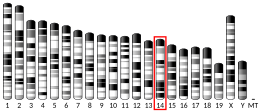KAT6B
Appearance
(Redirected from MYST4)
K(lysine) acetyltransferase 6B (KAT6B) is an enzyme that in humans is encoded by the KAT6B gene.[5][6][7]
Interactions
[edit]KAT6B has been shown to interact with RUNX2.[8]
Clinical significance
[edit]It has been demonstrated that de novo mutations in the gene KAT6B causes Young–Simpson syndrome and genitopatellar syndrome.[9][10][11][12][13]
References
[edit]- ^ a b c ENSG00000281813 GRCh38: Ensembl release 89: ENSG00000156650, ENSG00000281813 – Ensembl, May 2017
- ^ a b c GRCm38: Ensembl release 89: ENSMUSG00000021767 – Ensembl, May 2017
- ^ "Human PubMed Reference:". National Center for Biotechnology Information, U.S. National Library of Medicine.
- ^ "Mouse PubMed Reference:". National Center for Biotechnology Information, U.S. National Library of Medicine.
- ^ Nagase T, Ishikawa K, Nakajima D, Ohira M, Seki N, Miyajima N, Tanaka A, Kotani H, Nomura N, Ohara O (Sep 1997). "Prediction of the coding sequences of unidentified human genes. VII. The complete sequences of 100 new cDNA clones from brain which can code for large proteins in vitro". DNA Res. 4 (2): 141–50. doi:10.1093/dnares/4.2.141. PMID 9205841.
- ^ Champagne N, Bertos NR, Pelletier N, Wang AH, Vezmar M, Yang Y, Heng HH, Yang XJ (Nov 1999). "Identification of a human histone acetyltransferase related to monocytic leukemia zinc finger protein". J Biol Chem. 274 (40): 28528–36. doi:10.1074/jbc.274.40.28528. PMID 10497217.
- ^ "Entrez Gene: MYST4 MYST histone acetyltransferase (monocytic leukemia) 4".
- ^ Pelletier N, Champagne N, Stifani S, Yang XJ (Apr 2002). "MOZ and MORF histone acetyltransferases interact with the Runt-domain transcription factor Runx2". Oncogene. 21 (17): 2729–40. doi:10.1038/sj.onc.1205367. PMID 11965546. S2CID 19597517.
- ^ Campeau PM, Kim JC, Lu JT, Schwartzentruber JA, Abdul-Rahman OA, Schlaubitz S, Murdock DM, Jiang MM, Lammer EJ, Enns GM, Rhead WJ, Rowland J, Robertson SP, Cormier-Daire V, Bainbridge MN, Yang XJ, Gingras MC, Gibbs RA, Rosenblatt DS, Majewski J, Lee BH (Jan 18, 2012). "Mutations in KAT6B, Encoding a Histone Acetyltransferase, Cause Genitopatellar Syndrome". American Journal of Human Genetics. 90 (2): 282–9. doi:10.1016/j.ajhg.2011.11.023. PMC 3276659. PMID 22265014.
- ^ Clayton-Smith J, O'Sullivan J, Daly S, Bhaskar S, Day R, Anderson B, Voss AK, Thomas T, Biesecker LG, Smith P, Fryer A, Chandler KE, Kerr B, Tassabehji M, Lynch SA, Krajewska-Walasek M, McKee S, Smith J, Sweeney E, Mansour S, Mohammed S, Donnai D, Black G (Nov 2011). "Whole-Exome-Sequencing Identifies Mutations in Histone Acetyltransferase Gene KAT6B in Individuals with the Say-Barber-Biesecker Variant of Ohdo Syndrome". Am. J. Hum. Genet. 89 (5): 675–81. doi:10.1016/j.ajhg.2011.10.008. PMC 3213399. PMID 22077973.
- ^ Campeau PM, Kim JC, Lu JT, Schwartzentruber JA, Abdul-Rahman OA, Schlaubitz S, Murdock DM, Jiang MM, Lammer EJ, Enns GM, Rhead WJ, Rowland J, Robertson SP, Cormier-Daire V, Bainbridge MN, Yang XJ, Gingras MC, Gibbs RA, Rosenblatt DS, Majewski J, Lee BH (Jan 2012). "Mutations in KAT6B, Encoding a Histone Acetyltransferase, Cause Genitopatellar Syndrome". American Journal of Human Genetics. 90 (2): 282–9. doi:10.1016/j.ajhg.2011.11.023. PMC 3276659. PMID 22265014.
- ^ Campeau PM, Lu JT, Dawson BC, Fokkema IF, Robertson SP, Gibbs RA, Lee BH (Jun 19, 2012). "The KAT6B-related disorders Genitopatellar syndrome and Ohdo/SBBYS syndrome have distinct clinical features reflecting distinct molecular mechanisms". Human Mutation. 33 (11): 1520–5. doi:10.1002/humu.22141. PMC 3696352. PMID 22715153.
- ^ Mendez R, Delea M, Dain L, Rittler M (January 2020). "A novel pathogenic frameshift variant of KAT6B identified by clinical exome sequencing in a newborn with the Say–Barber–Biesecker–Young–Simpson syndrome". Clinical Dysmorphology. 29 (1): 42–45. doi:10.1097/mcd.0000000000000270. PMID 30921092. S2CID 85565150.
Further reading
[edit]- Pena AN, Pereira-Smith OM (2007). "The role of the MORF/MRG family of genes in cell growth, differentiation, DNA repair, and thereby aging". Ann. N. Y. Acad. Sci. 1100 (1): 299–305. Bibcode:2007NYASA1100..299P. doi:10.1196/annals.1395.031. PMID 17460191. S2CID 12635963.
- Nakajima D, Okazaki N, Yamakawa H, Kikuno R, Ohara O, Nagase T (2003). "Construction of expression-ready cDNA clones for KIAA genes: manual curation of 330 KIAA cDNA clones". DNA Res. 9 (3): 99–106. doi:10.1093/dnares/9.3.99. PMID 12168954.
- Topper M, Luo Y, Zhadina M, Mohammed K, Smith L, Muesing MA (2007). "Posttranslational Acetylation of the Human Immunodeficiency Virus Type 1 Integrase Carboxyl-Terminal Domain Is Dispensable for Viral Replication". J. Virol. 81 (6): 3012–7. doi:10.1128/JVI.02257-06. PMC 1865993. PMID 17182677.
- Olsen JV, Blagoev B, Gnad F, Macek B, Kumar C, Mortensen P, Mann M (2006). "Global, in vivo, and site-specific phosphorylation dynamics in signaling networks". Cell. 127 (3): 635–48. doi:10.1016/j.cell.2006.09.026. PMID 17081983. S2CID 7827573.
- Cereseto A, Manganaro L, Gutierrez MI, Terreni M, Fittipaldi A, Lusic M, Marcello A, Giacca M (2005). "Acetylation of HIV-1 integrase by p300 regulates viral integration". EMBO J. 24 (17): 3070–81. doi:10.1038/sj.emboj.7600770. PMC 1201351. PMID 16096645.
- Beausoleil SA, Jedrychowski M, Schwartz D, Elias JE, Villén J, Li J, Cohn MA, Cantley LC, Gygi SP (2004). "Large-scale characterization of HeLa cell nuclear phosphoproteins". Proc. Natl. Acad. Sci. U.S.A. 101 (33): 12130–5. Bibcode:2004PNAS..10112130B. doi:10.1073/pnas.0404720101. PMC 514446. PMID 15302935.
- Liu C, Lu J, Tan J, Li L, Huang B (2005). "Human interleukin-5 expression is synergistically regulated by histone acetyltransferase CBP/p300 and transcription factors C/EBP, NF-AT and AP-1". Cytokine. 27 (4–5): 93–100. doi:10.1016/j.cyto.2004.02.003. PMID 15271374.
- Pelletier N, Champagne N, Stifani S, Yang XJ (2002). "MOZ and MORF histone acetyltransferases interact with the Runt-domain transcription factor Runx2". Oncogene. 21 (17): 2729–40. doi:10.1038/sj.onc.1205367. PMID 11965546. S2CID 19597517.
- Panagopoulos I, Fioretos T, Isaksson M, Samuelsson U, Billström R, Strömbeck B, Mitelman F, Johansson B (2001). "Fusion of the MORF and CBP genes in acute myeloid leukemia with the t(10;16)(q22;p13)". Hum. Mol. Genet. 10 (4): 395–404. doi:10.1093/hmg/10.4.395. PMID 11157802.
External links
[edit]- MYST4+protein,+human at the U.S. National Library of Medicine Medical Subject Headings (MeSH)
- Overview of all the structural information available in the PDB for UniProt: Q8WYB5 (Histone acetyltransferase KAT6B) at the PDBe-KB.
This article incorporates text from the United States National Library of Medicine, which is in the public domain.






